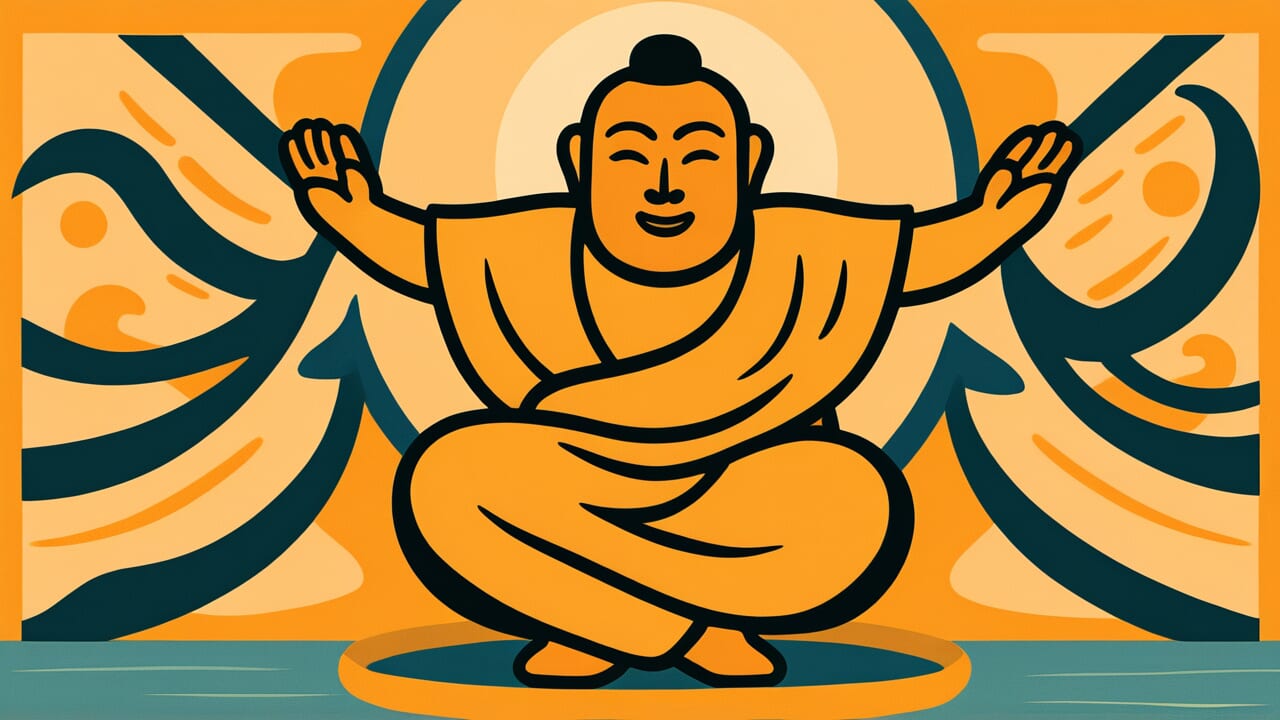How to Read “Become a demon or become a Buddha”
Oni ni mo nareba hotoke ni mo naru
Meaning of “Become a demon or become a Buddha”
This proverb means that people can become either good or evil depending on their circumstances and state of mind.
The same person can act with the compassion of a Buddha or behave with the cruelty of a demon. It all depends on their environment and mental state.
People use this proverb when they want to show that human goodness and evil are not fixed. They can change.
It serves as a warning against judging someone as purely good or purely bad. People also use it when reflecting on their own state of mind.
Today, this proverb helps us understand human complexity and how situations affect behavior.
It explains why people’s personalities can change under stress or when cornered. It also describes how kindness can shine through during difficult times.
Origin and Etymology
No clear written records explain the exact origin of this proverb. However, we can learn much from examining how the phrase is constructed.
The expression pairs two opposite beings: demons and Buddha. This suggests influence from Buddhist thought.
Buddhism teaches that Buddha-nature and worldly desires coexist within the human heart. Everyone has the potential to become a Buddha while also being vulnerable to evil thoughts.
In Japan, demons have long symbolized human fear and malice. Buddha, on the other hand, represents compassion and salvation.
By connecting these two with the word “nareba” (become), the proverb beautifully expresses human changeability.
The use of the verb “naru” (to become) is particularly interesting. The phrase doesn’t say “become like a demon” but “become a demon.”
This suggests a transformation so complete that a person changes into an entirely different being. It reflects a deep insight about human nature.
Our state of mind and circumstances can fundamentally change who we are.
This proverb was passed down as folk wisdom. It became established as a concise way to express human duality and adaptability.
Usage Examples
- That person can become a demon or become a Buddha depending on their position, so don’t judge them only by their current kindness
- When I think that humans can become a demon or become a Buddha, I’ve started paying more attention to my own state of mind
Universal Wisdom
This proverb has been passed down through generations because it touches on a deep truth about human nature. Everyone carries both light and darkness within their heart.
History shows us that people who committed atrocities during wartime were loving family members during peacetime.
Conversely, people who seem cold in daily life sometimes display remarkable courage and kindness in crisis situations.
This shows that humans are neither inherently good nor evil. We are shaped by our circumstances and choices.
The proverb teaches us the importance of humility in understanding people. It warns against the temptation to easily classify others as “good people” or “bad people.”
It encourages us to see the more complex and fluid nature of humanity.
At the same time, this is a message of hope. People who have made mistakes can change.
Those who seem virtuous now can fall if they become careless. Understanding both sides creates a balanced view of humanity.
It combines tolerance toward others with caution toward oneself.
Our ancestors didn’t see humans as fixed beings. They understood us as constantly changing.
This flexible view of human nature is the eternal wisdom contained in this proverb.
When AI Hears This
In quantum mechanics, an electron doesn’t exist in one definite place until observed. It exists in a superposition state, simultaneously in multiple locations.
Only when observed does it collapse to one location. This same structure applies to human nature.
We say “that person is kind,” but their essence isn’t actually kindness. They’re gentle like Buddha with children but strict like a demon with rivals.
Human nature exists in a superposition of both demon and Buddha possibilities until an observer appears. Just as a quantum particle’s position is determined by observation, humans become “demon” or “Buddha” only when determined by others or situations.
What’s more interesting is that in the observer effect, the observer also influences what’s being observed.
If you treat someone as an enemy, they’re more likely to behave like a demon. If you approach them with trust, they’re more likely to appear as Buddha.
The other person’s nature is partially created by how you observe them.
The word “nareba” in this proverb expresses exactly this collapse of state through observation. Human nature isn’t a fixed entity.
It’s a probabilistic existence that takes shape only within relationships.
Lessons for Today
This proverb teaches modern people both flexibility in viewing others and vigilance toward themselves.
First, consider how we view others. In our SNS-driven age, we tend to judge people by a single moment and label them.
However, this proverb reminds us that anyone can change depending on circumstances. It teaches the importance of tolerance.
We shouldn’t condemn people forever for past mistakes. We should believe in the possibility of change.
At the same time, it’s a warning to ourselves. Thinking “I’m a good person” is dangerous.
Stress, temptation, and power can always distort your judgment. That’s why it’s important to constantly observe your own state of mind.
Live consciously so you’re not swept away by your environment.
This proverb shows the two attitudes most necessary in human relationships. Hope for others, humility for yourself.
By maintaining both, we can grow into more mature human beings.



Comments